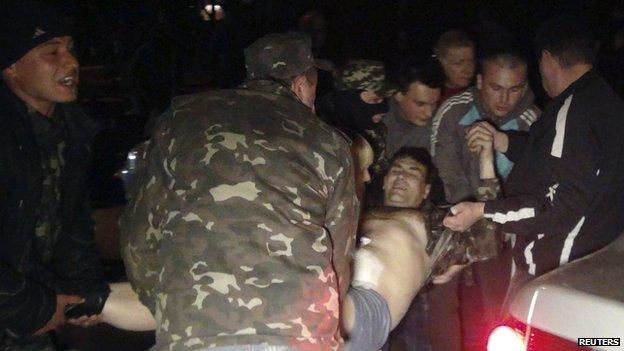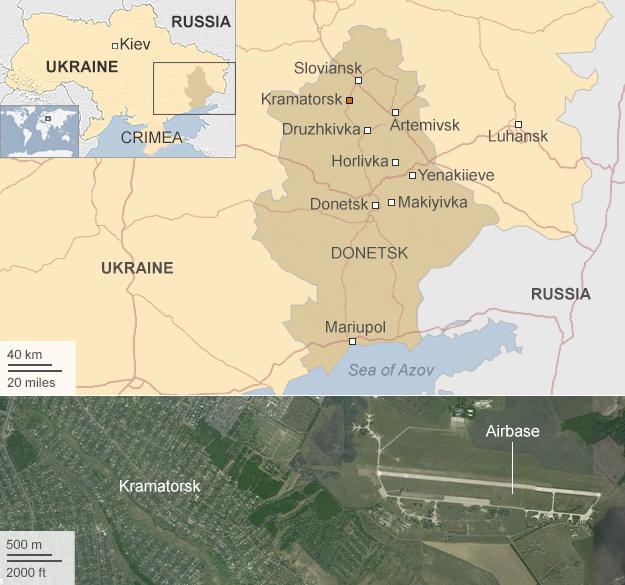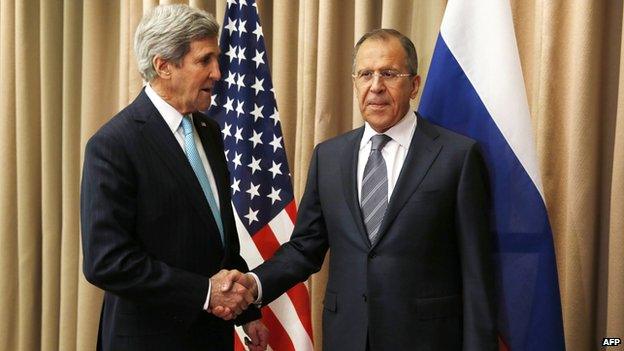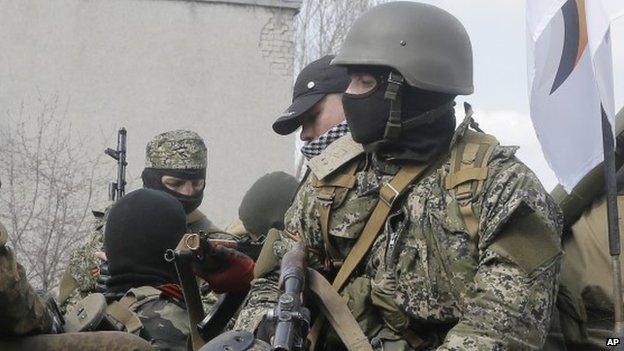Deadly clashes at Ukraine port base as leaders meet
- Published
Ukrainian attack helicopters buzzed villagers in Kramatorsk, but the army eventually had to give up, as Daniel Sandford reports
Three people were killed in a raid on a base in eastern Ukraine overnight, the country's interior minister says, as the US, Russia, the EU and Ukraine begin crisis talks in Geneva.
The three pro-Russian separatists were killed in a clash with Ukrainian forces in Mariupol, Interior Minister Arsen Avakov said on Facebook.
The Geneva meeting is the first such gathering since the crisis escalated.
The West says Russia is aiding the pro-Russian activists occupying buildings.
In a live TV phone-in on Thursday, Russia's President Vladimir Putin warned Kiev of "the abyss they're heading into" in eastern Ukraine and urged dialogue.
He said the Kiev government, which had "seized power", had only spoken to its own appointees in the region, but "not to the people whom locals trust".
He dismissed as "rubbish" allegations that Russian special forces were operating in eastern Ukraine.
When asked if Russia was planning to send troops to the troubled region he said parliament had given him the right to do so, but hoped he would not have to use that right.
Admission on Crimea
Tensions escalated last month when Russia annexed Crimea, causing international outrage. Unrest later spread to Donetsk region, another mainly Russian-speaking area. It is Europe's worst crisis since the Cold War.
Mr Putin took questions from residents of Sevastopol, base of the Russian fleet in Crimea, the first place to feature in his live broadcast. It is the first time Crimea has been included in Mr Putin's annual phone-in.
He insisted that Russian speakers in Ukraine "must be equal citizens... it's a question of guarantees for those people".
He also admitted for the first time that Russian troops had been "behind the backs of self-defence forces in Crimea" to ensure that last month's referendum there could be held and that weapons stores were not seized by Ukrainian forces.
Russia's annexation of Crimea has fuelled concern that other parts of eastern Ukraine could also break away from Kiev's control and join Russia.
President Vladimir Putin: ''There are no Russian units in eastern Ukraine''

A man wounded in the clash in Mariupol is given first aid

Fighting in Mariupol
Overnight about 300 pro-Russian separatists attacked a military unit in Mariupol near the Azov Sea, throwing petrol bombs. Troops opened fire, killing three, Mr Avakov said.
The operation is continuing - Ukraine has sent in reinforcements including helicopters. There was no independent confirmation of his statement.
According to Mr Avakov, 13 of the attackers were wounded and so far 63 have been detained. He said none of the interior ministry troops had been killed.
It is the heaviest casualty toll in any single incident so far in eastern Ukraine.
Mariupol is in the far south of Donetsk region, where separatists have seized dozens of official buildings.
Ukrainian SBU special forces have gone to the aid of the interior ministry troops in Mariupol and armoured vehicles have gone into the city from places nearby, Ukraine's Unian news agency reports.
Retreating separatists reportedly wounded two passers-by, set a minibus ablaze and also set fire to a building next to the military garrison.
"Through joint efforts by the armed police and national guard the attacking gang was dispersed after a short battle, most of them were cornered and disarmed," Mr Avakov said.
"Because it was such an aggressive attack on a military unit - an interior ministry group - we decided to reinforce them with Omega special forces. Helicopters have been deployed."
According to a report on Russia's state-run Vesti TV news, unarmed local protesters tried to talk to the Ukrainian troops but were met with gunfire. Quoting unnamed Mariupol residents, the TV channel said shots were also fired at first-aid paramedics.
US accuses Russia
Earlier, US President Barack Obama warned Russia against support for further action by armed pro-Russian groups.
"What I have said consistently is that each time Russia takes these kinds of steps that are designed to destabilise Ukraine and violate their sovereignty, that there are going to be consequences," he said.
President Barack Obama: ''Each times Russia takes these kinds of steps..there are going to be consequences''
Reports say that the White House is considering a package of non-lethal aid for the Ukrainian military. This may include clothing and medical supplies.
Meanwhile, Ukraine's military operation against separatists has hit obstacles.
Called an "anti-terrorist" operation by the Kiev government, it started on Tuesday and is designed to dislodge pro-Russia gunmen from local authority buildings.
Pro-Russian activists want referendums on greater autonomy for the south-east or the right to join the Russian Federation.
But in several districts, Ukrainian troops met vehement opposition on Wednesday from pro-Russia militants.
In the city of Kramatorsk, six military vehicles were commandeered by gunmen, who disarmed the Ukrainian soldiers and sent some of them home on buses.
Daniel Sandford in Sloviansk: "This Ukrainian armoured vehicle has been rebranded with a Russian flag"
And just south of Sloviansk a column of 14 Ukrainian military vehicles was surrounded by local civilians and pro-Russian gunmen, who made the Ukrainian troops unload their magazines and drive off.
The foreign ministers of the US, EU, Ukraine and Russia have started talks in Geneva.
The US and the EU want an end to the occupations in eastern Ukraine and for the estimated 40,000-strong Russian forces massed near the Ukrainian border to pull back.

The US and Russian foreign affairs chiefs - John Kerry and Sergei Lavrov - met in Geneva on Thursday

Pro-Russian gunmen seized Ukrainian military vehicles and took them to Sloviansk
A US official stressed that Russia must "take this opportunity to de-escalate" or face a tightening of sanctions.
Ukrainian Foreign Minister, Andriy Deshchytsya, called on Russia "not to support terrorist activities in eastern Ukraine."
Russia, which strongly opposed the ousting of Ukraine's pro-Moscow President Viktor Yanukovych in February, has proposed a new constitution which devolves more power to the regions.
Expectations for the talks are low, says the BBC's Gavin Hewitt in Geneva.
Russia's stance has particularly alarmed Nato member countries with large Russian-speaking minorities, such as Latvia and Estonia.
So Nato announced on Wednesday that it was beefing up its eastern members' defences.
In Brussels, Nato Secretary General Anders Fogh Rasmussen promised "more planes in the air, more ships on the water, more readiness on the land".